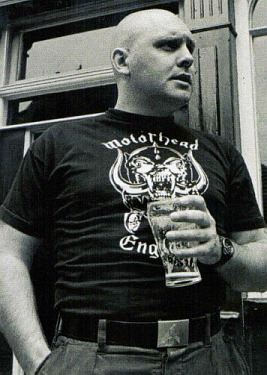Related Research Articles

A skinhead or skin is a member of a subculture that originated among working-class youths in London, England, in the 1960s. It soon spread to other parts of the United Kingdom, with a second working-class skinhead movement emerging worldwide in the late 1970s. Motivated by social alienation and working-class solidarity, skinheads are defined by their close-cropped or shaven heads and working-class clothing such as Dr. Martens and steel toe work boots, braces, high rise and varying length straight-leg jeans, and button-down collar shirts, usually slim fitting in check or plain. The movement reached a peak at the end of the 1960s, experienced a revival in the 1980s, and, since then, has endured in multiple contexts worldwide.
National Socialist black metal is a political movement and a subgenre within the black metal music scene that promotes neo-Nazism, neo-fascism, and white supremacist ideologies. NSBM artists typically combine neo-Nazi imagery and ideology with ethnic European paganism, Satanism, or Nazi occultism, or a combination thereof, and vehemently oppose Christianity, Islam and Judaism from a racialist viewpoint. NSBM is not seen as a distinct genre, but as a völkisch movement within black metal. According to Mattias Gardell, NSBM musicians see this ideology as "a logical extension of the political and spiritual dissidence inherent in black metal".

Skinheads Against Racial Prejudice (SHARP) are anti-racist skinheads who oppose white power skinheads, neo-fascists and other political racists, particularly if they identify themselves as skinheads. SHARPs claim to reclaim the original multicultural identity of the original skinheads, hijacked by white power skinheads, who they sometimes deride as "boneheads".

Ian Stuart Donaldson, also known as Ian Stuart, was an English neo-Nazi musician. He was best known as the front-man of Skrewdriver, a punk band which, from 1983 onwards, he rebranded as a White power and Rock Against Communism band. He raised money through white power concerts with his Blood & Honour network.
Blood & Honour is a neo-Nazi music promotion network and right-wing extremist political group founded in the United Kingdom by Ian Stuart Donaldson and Nicky Crane in 1987. It is composed of White Nationalists and has links to Combat 18.

Rock Against Communism (RAC) was the name of white power rock concerts in the United Kingdom in the late 1970s and early 1980s, and has since become the catch-all term for music with racist lyrics as well as a specific genre of rock music derived from Oi!. The lyrics can focus on racism and antisemitism, though this depends on the band.

Böhse Onkelz, sensational spelling of böse Onkels is a German rock band formed in Frankfurt in 1980. The band reunited in 2014. Despite mass-media criticism concerning their past as skinheads, several of their later records topped the German album charts. E.I.N.S. was their most successful album, with over 510,000 copies sold.

Anthony Charles Wakeford is a British neofolk musician, who primarily records under the name Sol Invictus. He is also a member of the punk rock band Crisis and a co-founder of Death in June.
White power skinheads, also known as racist skinheads and neo-Nazi skinheads, are members of a neo-Nazi, white supremacist and antisemitic offshoot of the skinhead subculture. Many of them are affiliated with white nationalist organizations and some of them are members of prison gangs. The movement emerged in the United Kingdom between the late 1960s and the late 1970s, before spreading across Eurasia and North America in the 1980–1990s.
Skullhead was a nationalist Oi! band from the Newcastle area. It was part of the Rock Against Communism (RAC) movement.
Skrewdriver were an English punk rock band formed by Ian Stuart Donaldson in Poulton-le-Fylde, Lancashire, in 1976. Originally a punk band, Skrewdriver changed into a white power skinhead rock band after reuniting in the 1980s. Their original line-up split in January 1979 and Donaldson reformed the band with different musicians in 1982. This new version of the band played a leading role in the Rock Against Communism movement.
Rebelles Européens was a French independent record label that operated between 1987 and 1994, specialising in white power rock and Rock Against Communism. Based in the port city of Brest, the label was founded by Gaël Bodilis, a member of far-right groups including the Front Nationale Jeunesse, Troisième Voie, and PNFE. Rebelles Européens was, alongside German label Rock-O-Rama Records, a key player within the international white power skinhead music scene during the late 1980s and early 1990s. Unlike Rock-O-Rama, whose owner was apolitical and commercially minded, Bodilis primarily conceived of Rebelles Européens as a means for spreading neo-fascist ideology, and denied any interest in the profitability of his enterprise. Rebelles Europeéns was notable for its brazen inclusion of Nazi and white-supremacist symbols on album covers; Robert Forbes and Eddie Stampton suggest that the label "seemed to operate without regard to the law". After a pause on production in 1993, Rebelles Europeéns went out of business in 1994, with Australian label White League reissuing a small number of their releases on CD in 1995.
German punk includes a body of music and a subculture that have evolved since punk rock became popular in Germany in the 1970s. Within the subculture of punk in Germany, a style of music called Deutschpunk was developed; this style of music has developed distinctly from hardcore punk, and includes lyrics in German as well as a fast tempo. In the punk scene in Germany, some bands play music in the Deutschpunk style, while other German punk bands pursue various other styles of punk music.
Oi! is a subgenre of punk rock that originated in the United Kingdom in the late 1970s. The music and its associated subculture had the goal of bringing together punks, skinheads, and other disaffected working-class youth. The movement was partly a response to the perception that many participants in the early punk rock scene were, in the words of The Business guitarist Steve Kent, "trendy university people using long words, trying to be artistic... and losing touch."
No Remorse are an English white power rock band formed in London in 1985. They were one of the most prominent neo-Nazi skinheads bands of the Rock Against Communism scene. The band was led by Paul Burnley between 1986 and 1996, and by William Browning and Daniel "Jacko" Jack from 1996 onwards, following a factional dispute within British white nationalist politics.
Clark Reid Martell is an American white supremacist and the former leader of Chicago Area SkinHeads (CASH), which was founded in 1985 by six skinheads under his leadership. This was the first organized neo-Nazi white power skinhead group in the United States. The group was also called Romantic Violence, and was the first US distributor of records and tapes from the English band Skrewdriver.
Combat 84 was an English punk rock band active during the early 1980s. Formed in 1981 in Chelsea, London by skinheads 'Chubby' Chris Henderson and 'Deptford' John Armitage, Combat 84 rose to national prominence after being featured in a controversial 1982 BBC Arena documentary about the skinhead movement.
White power music is music that promotes white nationalism. It encompasses various music styles, including rock, country, and folk. Ethnomusicologist Benjamin R. Teitelbaum argues that white power music "can be defined by lyrics that demonize variously conceived non-whites and advocate racial pride and solidarity. Most often, however, insiders conceptualized white power music as the combination of those themes with pounding rhythms and a charging punk or metal-based accompaniment." Genres include Nazi punk, Rock Against Communism, National Socialist black metal, and fashwave.
Endstufe is a German far-right rock band from Bremen.
References
- 1 2 3 4 5 6 7 8 Raposo, Ana; Bestley, Russ (1 November 2020). "Designing fascism: The evolution of a neo-Nazi punk aesthetic" (PDF). Punk & Post-Punk. 9 (3): 467–498. doi:10.1386/punk_00039_1. ISSN 2044-1983. S2CID 226680220.
- ↑ "The Germans Are Coming part 1: Vomit Visions and Running Soldiers". Creases Like Knives. 15 March 2022. Retrieved 4 March 2023.
- 1 2 3 "The Germans Are Coming part 2: Bad uncles and nasty stuff". Creases Like Knives. 15 March 2022. Retrieved 4 March 2023.
- ↑ Forbes, Robert; Stampton, Eddie (9 November 2015). The white nationalist skinhead movement : UK & USA, 1979-1993. p. 119. ISBN 978-1-62731-024-6. OCLC 908072099.
- ↑ Cotter, John M. (1996). "Sounds of hate: White power rock and roll and the neo‐nazi skinhead subculture". Terrorism and Political Violence. 11 (2): 119. doi:10.1080/09546559908427509. ISSN 0954-6553.
- ↑ Brown, Timothy S. (2004). "Subcultures, Pop Music and Politics: Skinheads and "Nazi Rock" in England and Germany". Journal of Social History. 38 (1): 157–178. doi:10.1353/jsh.2004.0079. ISSN 0022-4529. JSTOR 3790031. S2CID 42029805.
- 1 2 Protzman, Ferdinand (4 February 1993). "Germans Crack Down on Right-Wing Rock Music". The New York Times. ISSN 0362-4331 . Retrieved 4 March 2023.
- 1 2 3 4 Dyck, Kirsten (2017). Reichrock: The International Web of White-Power and Neo-Nazi Hate Music. Rutgers University Press. p. 41. ISBN 9780813574738.
- 1 2 Ossami, Darius (26 April 2022). "Buch über Rechtsrocklabel: Angenehme Unterhaltung mit Herbert". Die Tageszeitung: taz (in German). ISSN 0931-9085 . Retrieved 5 March 2023.
- ↑ Williams, Rock; Sands, Robert (23 August 2023). "Rock-O-Rama is Still Here, Still Selling Nazi Records". Left Coast Right Watch. Retrieved 8 March 2023.